The Works of Plato (24 vols.)
Digital Logos Edition
Overview
Philosopher and mathematician A. N. Whitehead once claimed that “the safest general characterization of European philosophical tradition is that it consists of a series of footnotes to Plato.” It is difficult to disagree with him. Plato wrote seminal works on ethics, political theory, morality, epistemology, and metaphysics. His concept of forms went on to have a great influence on Christian theology in the post-Apostolic period. Many of the ideas that form the basis for Western democracy come from his Republic.
Plato’s works are written as a series of dialogues wherein a number of characters (the chief of which is usually Socrates) discuss various philosophical questions. By both their questions and their answers, the characters explain Plato’s various ideas. Plato’s 25-plus dialogues are the best-known use of the Socratic method—that is, the use of dialogue in teaching. This collection of the works of Plato contains all the dialogues commonly attributed to Plato in their Loeb Classical Library editions, with the original Greek and an English translation side by side.
The Logos edition of Plato’s works gives you the kind of intertextual connections that philosophers and theologians have dreamed of for centuries. All 24 volumes are completely indexed and linked across all the other works in your Logos library. Logos’ powerful search functions make Plato’s dialogues vastly more accessible. In addition, names and concepts link to the other texts in your Logos library, allowing you to cross-reference and compare. See how Plato’s ideas influenced Aristotle by pulling them up side by side and comparing them for yourself.
This title is included in the following collections
You can save when you purchase this product as part of a collection.
Loeb Classical Library Builder...
$1,269.18$508.99Greek Classics Research Librar...
$599.99$599.99Logos 8 Lutheran Platinum Lega...
$1,499.99$1,499.99Logos 7 Lutheran Platinum Lega...
$1,499.99$1,499.99
- $1,499.99
- $2,999.99
- $2,999.99
- $2,999.99
- $2,999.99
- $3,413.99
- $4,749.99
- $4,749.99
- $4,749.99
- $4,749.99
- $12,102.39$7,299.99
- $21,749.99
- $24,999.99

- The complete works of the founding figure of Western Philosophy
- Side-by-side Greek text and English translation
- Loeb Classical Library editions
- Title: The Works of Plato
- Author: Plato
- Translators: W. R. M. Lamb, H. N. Fowler, R. G. Bury, and Paul Shorey
- Series: Loeb Classical Library
- Publishers: Harvard University Press and G. P. Putnam’s Sons
- Volumes: 24
- Pages: 6,702
- Euthyphro. Apology. Crito. Phaedo. Phaedrus
- Euthyphro. Apology. Crito. Phaedo. Phaedrus: Greek Text
- Theaetetus. Sophist
- Theaetetus. Sophist: Greek Text
- Laches. Protagoras. Meno. Euthydemus
- Laches. Protagoras. Meno. Euthydemus: Greek Text
- Statesman. Philebus. Ion
- Statesman. Philebus. Ion: Greek Text
- Lysis. Symposium. Gorgias
- Lysis. Symposium. Gorgias: Greek Text
- Laws, vol. 1
- Laws, vol. 1: Greek Text
- Laws, vol. 2
- Laws, vol. 2: Greek Text
- Cratylus. Parmenides. Great Hippias. Lesser Hippias
- Cratylus. Parmenides. Great Hippias. Lesser Hippias: Greek Text
- Charmides. Alcibiades I and II. Hipparchus. The Lovers. Theages. Minos. Epinomis
- Charmides. Alcibiades I and II. Hipparchus. The Lovers. Theages. Minos. Epinomis: Greek Text
- Timaeus. Critias. Cleitophon. Menexenus. Epistles
- Timaeus. Critias. Cleitophon. Menexenus. Epistles: Greek Text
- Republic, vol. 1
- Republic, vol. 1: Greek Text
- Republic, vol. 2
- Republic, vol. 2: Greek Text
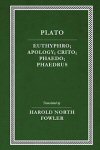
This volume contains H. N. Fowler’s translation of Plato’s Euthyphro, Crito, Phaedo, Phaedrus, and his account of Socrates’ trial for treason: Apology.
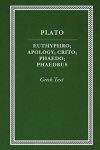
This volume contains the Greek text of Plato’s Euthyphro, Crito, Phaedo, Phaedrus, and his account of Socrates’ trial for treason: Apology.
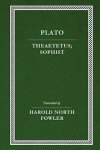
Theaetetus. Sophist
- Author: Plato
- Translator: H. N. Fowler
- Series: Loeb Classical Library
- Publisher: G. P. Putnam’s Sons
- Publication Date: 1921
- Pages: 240
This volume contains H. N. Fowler’s translation of Plato’s Theaetetus and Sophist.
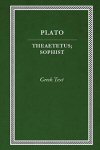
Theaetetus. Sophist: Greek Text
- Author: Plato
- Series: Loeb Classical Library
- Publisher: G. P. Putnam’s Sons
- Publication Date: 1921
- Pages: 240
This volume contains the Greek text of Plato’s Theaetetus and Sophist.
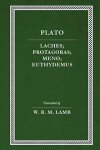
Laches. Protagoras. Meno. Euthydemus
- Author: Plato
- Translator: W. R. M. Lamb
- Series: Loeb Classical Library
- Publisher: Harvard University Press
- Publication Date: 1924
- Pages: 274
This volume contains W. R. M. Lamb’s translation of Plato’s Laches, Protagoras, Meno, and Euthydemus.
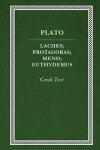
Laches. Protagoras. Meno. Euthydemus: Greek Text
- Author: Plato
- Series: Loeb Classical Library
- Publisher: Harvard University Press
- Publication Date: 1924
- Pages: 274
This volume contains the Greek text of Plato’s Laches, Protagoras, Meno, and Euthydemus.
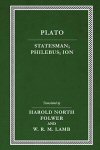
Statesman. Philebus. Ion
- Author: Plato
- Translator: H. N. Folwer and W. R. M. Lamb
- Series: Loeb Classical Library
- Publisher: Harvard University Press
- Publication Date: 1925
- Pages: 240
This volume contains H. N. Fowler and W. R. M. Lamb’s translation of Plato’s Statesman, Philebus, and Ion.
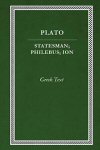
Statesman. Philebus. Ion: Greek Text
- Author: Plato
- Series: Loeb Classical Library
- Publisher: Harvard University Press
- Publication Date: 1925
- Pages: 240
This volume contains the Greek text of Plato’s Statesman, Philebus, and Ion.
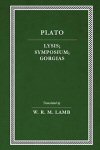
Lysis. Symposium. Gorgias
- Author: Plato
- Translator: W. R. M. Lamb
- Series: Loeb Classical Library
- Publisher: Harvard University Press
- Publication Date: 1925
- Pages: 280
This volume contains W. R. M. Lamb’s translation of Plato’s Lysis, Symposium, and Gorgias.
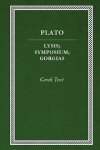
Lysis. Symposium. Gorgias: Greek Text
- Author: Plato
- Series: Loeb Classical Library
- Publisher: Harvard University Press
- Publication Date: 1925
- Pages: 280
This volume contains the Greek text of Plato’s Lysis, Symposium, and Gorgias.
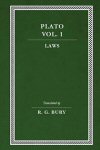
Laws, vol. 1
- Author: Plato
- Translator: R. G. Bury
- Series: Loeb Classical Library
- Publisher: Harvard University Press
- Publication Date: 1926
- Pages: 270
This volume contains R. G. Bury’s translation of the first six books of Plato’s Laws.
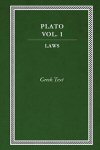
Laws, vol. 1: Greek Text
- Author: Plato
- Series: Loeb Classical Library
- Publisher: Harvard University Press
- Publication Date: 1926
- Pages: 270
This volume contains the Greek text of the first six books of Plato’s Laws.
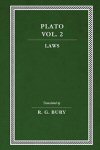
Laws, vol. 2
- Author: Plato
- Translator: R. G. Bury
- Series: Loeb Classical Library
- Publisher: G. P. Putnam’s Sons
- Publication Date: 1926
- Pages: 300
This volume contains R. G. Bury’s translation of books six through twelve of Plato’s Laws.
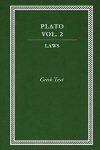
Laws, vol. 2: Greek Text
- Author: Plato
- Series: Loeb Classical Library
- Publisher: G. P. Putnam’s Sons
- Publication Date: 1926
- Pages: 300
This volume contains the Greek text of books six through twelve of Plato’s Laws.
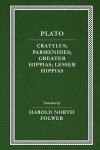
Cratylus. Parmenides. Greater Hippias. Lesser Hippias
- Author: Plato
- Translator: H. N. Fowler
- Series: Loeb Classical Library
- Publisher: Harvard University Press
- Publication Date: 1926
- Pages: 248
This volume contains H. N. Fowler’s translation of Plato’s Cratylus, Parmenides, Greater Hippias, and Lesser Hippias.
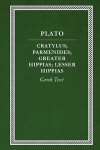
Cratylus. Parmenides. Greater Hippias. Lesser Hippias: Greek Text
- Author: Plato
- Series: Loeb Classical Library
- Publisher: Harvard University Press
- Publication Date: 1926
- Pages: 248
This volume contains the Greek text of Plato’s Cratylus, Parmenides, Greater Hippias, and Lesser Hippias.
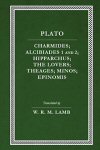
Charmides. Alcibiades I and II. Hipparchus. The Lovers. Theages. Minos. Epinomis
- Author: Plato
- Translator: W. R. M. Lamb
- Series: Loeb Classical Library
- Publisher: G. P. Putnam’s Sons
- Publication Date: 1927
- Pages: 260
This volume contains W. R. M. Lamb’s translation of Plato’s Charmides, Alcibiades I and II, Hipparchus, The Lovers, Theages, Minos, and Epinomis.
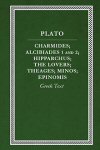
Charmides. Alcibiades I and II. Hipparchus. The Lovers. Theages. Minos. Epinomis: Greek Text
- Author: Plato
- Series: Loeb Classical Library
- Publisher: G. P. Putnam’s Sons
- Publication Date: 1927
- Pages: 260
This volume contains the Greek text of Plato’s Charmides, Alcibiades I and II, Hipparchus, The Lovers, Theages, Minos, and Epinomis.
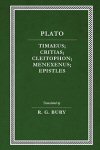
Timaeus. Critias. Cleitophon. Menexenus. Epistles
- Author: Plato
- Translator: R. G. Bury
- Series: Loeb Classical Library
- Publisher: Harvard University Press
- Publication Date: 1929
- Pages: 328
This volume contains R. G. Bury’s translation of Plato’s Timaeus, Critias, Cleitophon, Menexenus, and Epistles.
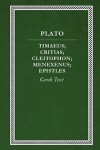
Timaeus. Critias. Cleitophon. Menexenus. Epistles: Greek Text
- Author: Plato
- Series: Loeb Classical Library
- Publisher: Harvard University Press
- Publication Date: 1929
- Pages: 328
This volume contains the Greek text of Plato’s Timaeus, Critias, Cleitophon, Menexenus, and Epistles.
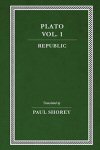
Republic, vol. 1
- Author: Plato
- Translator: Paul Shorey
- Series: Loeb Classical Library
- Publisher: Harvard University Press
- Publication Date: 1930
- Pages: 288
This volume contains Paul Shorey’s translation of the first five books of Plato’s Republic.
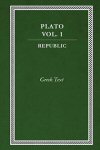
Republic, vol. 1: Greek Text
- Author: Plato
- Series: Loeb Classical Library
- Publisher: Harvard University Press
- Publication Date: 1930
- Pages: 288
This volume contains the Greek text of the first five books of Plato’s Republic.
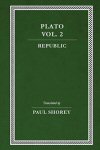
Republic, vol. 2
- Author: Plato
- Translator: Paul Shorey
- Series: Loeb Classical Library
- Publisher: Harvard University Press
- Publication Date: 1935
- Pages: 316
This volume contains Paul Shorey’s translation of books six through ten of Plato’s Republic.
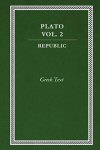
Republic, vol. 2: Greek Text
- Author: Plato
- Series: Loeb Classical Library
- Publisher: Harvard University Press
- Publication Date: 1935
- Pages: 316
This volume contains the Greek text of books six through ten of Plato’s Republic.
Plato (427–347 BC) was born in Athens to an aristocratic family. A student of Socrates until the latter’s death, he also studied the works of Herculitus, Parmenides, and the Pythagoreans. Following the death of Socrates, Plato spent a number of years travelling around the Mediterranean. He eventually returned to Athens and founded a school of philosophy called the Academy (named for the field in which it was located), where he later taught Aristotle.
Plato wrote works on ethics, politics, morality, epistemology, and metaphysics. He is best known for his theory of forms, the theory that the qualities that define a thing’s existence (redness, beauty) exist in an abstract realm of forms, separate from matter. Plato believed that what was true, and therefore real, must be unchanging. Because the material world is in a constant state of change it is not true reality but a mere illusion. Plato taught that love is the longing for the Beautiful in its purest, most abstract, form. Consequently, love is what motivates all the highest human achievements.
Reviews
7 ratings

SEONGJAE YEO
10/5/2019

Marcus Martin
1/6/2015

Denver Race
11/14/2014

William L White
11/3/2014

Larry Proffitt (I
10/6/2014

Allen Bingham
8/30/2014

Jim Wait
8/23/2014
Peter Llewellyn
12/6/2013
Incredible value. Years ago when hit by illness and poverty I sold my 4 vols of Jowett's translation of The Dialogues of Plato - my friend mistakenly accepted $20 instead of the $200 I was asking. This wonderful offer - for a better version, because the Loeb has the Greek as well as the English (in another fine translation). This opens up possibilities undreamt of back in my early days of philosophy.